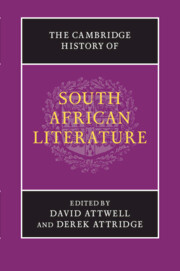Book contents
- Frontmatter
- Introduction
- PART I ORATURES, ORAL HISTORIES, ORIGINS
- PART II EXPLORATION, EARLY MODERNITY AND ENLIGHTENMENT AT THE CAPE, 1488–1820
- PART III EMPIRE, RESISTANCE AND NATIONAL BEGINNINGS, 1820–1910
- PART IV MODERNISM AND TRANSNATIONAL CULTURE, 1910–1948
- 14 Black writers and the historical novel: 1907–1948
- 15 The Dertigers and the plaasroman: two brief perspectives on Afrikaans literature
- 16 New African modernity and the New African movement
- 17 Refracted modernisms: Roy Campbell, Herbert Dhlomo, N. P. van Wyk Louw
- 18 The metropolitan and the local: Douglas Blackburn, Pauline Smith, William Plomer, Herman Charles Bosman
- PART V APARTHEID AND ITS AFTERMATH, 1948 TO THE PRESENT
- PART VI SOUTH AFRICAN LITERATURE: CONTINUITIES AND CONTRASTS
- Index
- References
15 - The Dertigers and the plaasroman: two brief perspectives on Afrikaans literature
from PART IV - MODERNISM AND TRANSNATIONAL CULTURE, 1910–1948
Published online by Cambridge University Press: 28 January 2012
- Frontmatter
- Introduction
- PART I ORATURES, ORAL HISTORIES, ORIGINS
- PART II EXPLORATION, EARLY MODERNITY AND ENLIGHTENMENT AT THE CAPE, 1488–1820
- PART III EMPIRE, RESISTANCE AND NATIONAL BEGINNINGS, 1820–1910
- PART IV MODERNISM AND TRANSNATIONAL CULTURE, 1910–1948
- 14 Black writers and the historical novel: 1907–1948
- 15 The Dertigers and the plaasroman: two brief perspectives on Afrikaans literature
- 16 New African modernity and the New African movement
- 17 Refracted modernisms: Roy Campbell, Herbert Dhlomo, N. P. van Wyk Louw
- 18 The metropolitan and the local: Douglas Blackburn, Pauline Smith, William Plomer, Herman Charles Bosman
- PART V APARTHEID AND ITS AFTERMATH, 1948 TO THE PRESENT
- PART VI SOUTH AFRICAN LITERATURE: CONTINUITIES AND CONTRASTS
- Index
- References
Summary
Afrikaans writers of the 1930s
The two main figures who interpreted the renewal brought to Afrikaans literature by the Dertigers (Poets of the Thirties) were N. P. van Wyk Louw (1906–70), the most prominent Dertiger, and D. J. Opperman (1914–85), who appeared on the literary scene about a decade after him. Both these poets were also academics and men of letters. Due to their erudition and sound judgement their views on Afrikaans literature and its historical development gained lasting authority. Van Wyk Louw entered the discursive arena at key moments to decisively shift the debate, as he did at the beginning of the 1960s in Vernuwing in die Prosa (Innovation in Fiction).Opperman's defining anthology Groot Verseboek (Great Book of Verse), first published in 1951, survives up to the present and has had a huge influence in shaping literary tastes. In different ways Van Wyk Louw and Opperman established a canon that would remain virtually unchallenged for many years. As late as 1969, for example, Ernst van Heerden's essay on nationalism and literature (‘Nasionalisme en Literatuur’, pp. 22–44) largely reiterates ideas formulated by VanWyk Louw thirty years earlier.
Van Wyk Louw and Opperman were key figures in the establishment of a new cast in the Afrikaans literary world: that of the literary critic. In their writings and those of contemporaries such as H. A. Mulder (1906–49), W. E. G. Louw (1913–80) and Gerrit Dekker (1887–1973), the patriotically supportive literary culture of previous generations was replaced by a more erudite, demanding, combative and comparative approach.
- Type
- Chapter
- Information
- The Cambridge History of South African Literature , pp. 308 - 324Publisher: Cambridge University PressPrint publication year: 2012
References
- 2
- Cited by



